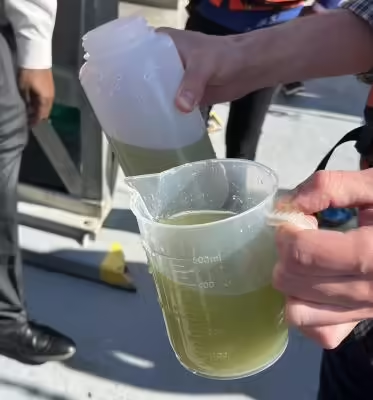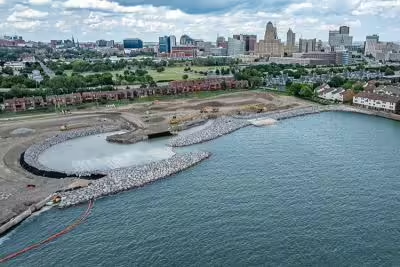Category: Other
EPA Announces $4 Million Funding Opportunity for Phosphorus Reduction Efforts in Western Lake Erie Basin
EPA Announces $4 Million Funding Opportunity for Phosphorus Reduction Efforts in Western Lake Erie Basin
josterme01
Fri, 09/27/2024 – 4:08 pm
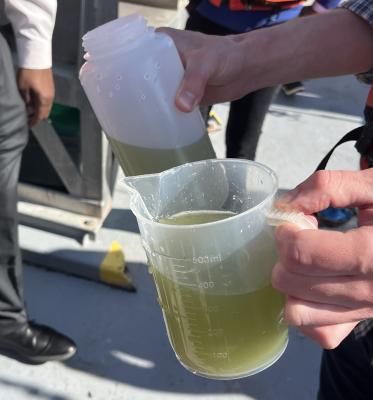
U.S. Environmental Protection Agency has announced the availability of $4 million in Great Lakes Restoration Initiative funding to support phosphorus reduction efforts in the western Lake Erie basin through farmer outreach and technical assistance. Applications will be accepted until November 22, 2024.
The western basin of Lake Erie experiences harmful algal blooms each summer. Reducing phosphorus loading from the surrounding watershed is expected to substantially reduce the extent of harmful algal blooms. The primary objective of this funding opportunity is to increase the resources available to help farmers improve their nutrient management.
Learn about eligibility, western Lake Erie Basin watershed definitions, application and webinar information on EPA’s 2024 Notice of Funding Opportunity webpage.
The Kincardine Independent
Huron Shores Hospice held its largest annual fundraising event, Handbags for Hospice, at the Kincardine Pavilion on Thursday, Sept. 19. The evening raised over $170,000 in support of the two-bedroom … Continue reading Handbags for Hospice raises a whopping $170,000
The post Handbags for Hospice raises a whopping $170,000 appeared first on Kincardine Independent.
NOAA’s Great Lakes Bay Watershed Education and Training Program Announces 2024 Awards
NOAA’s Great Lakes Bay Watershed Education and Training Program Announces 2024 Awards
josterme01
Fri, 09/20/2024 – 1:02 pm
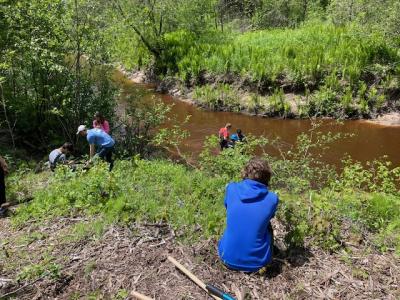
NOAA Great Lakes Bay Watershed Education and Training (B-WET) program announced $652,117 in funding for seven environmental education projects throughout the Great Lakes basin. Great Lakes B-WET awards are funded through the Great Lakes Restoration Initiative (GLRI). Each project will address one of the three priority areas of the Great Lakes B-WET program: (1) new projects that use the Meaningful Watershed Educational Experiences framework (MWEE), (2) Systemic MWEE Implementation, or (3) Capacity building for expanded statewide K-12 environmental literacy initiatives.
The funded projects throughout the Great Lakes basin are:
- Cuyahoga Soil and Water Conservation District: Implementing Meaningful Watershed Educational Experiences in the Tinker’s Creek Watershed
- Friends of the St. Clair River: St. Clair River Watershed Pen Pals: From Creeks to Coast
- Great Lakes Stewardship Initiative: Advancing K-12 Environmental Literacy through Place-Based Stewardship Education (PBSE) in Michigan and the Great Lakes Region
- Huron-Clinton Metropolitan Authority: Science and Stewardship in the Heart of the Great Lakes
- ODC Network: River Keepers: Understanding the Impacts of Human Activity and Climate Change on Local Watersheds
- Riveredge Nature Center Inc: Water Journeys: Empowering Middle-Schoolers to Improve the Milwaukee River
- University of Michigan at Ann Arbor: Climate Change in the Bay: Designing Meaningful Student Experiences in the Saginaw Bay Watershed
Read more about each of these projects, and projects funded in previous years, at https://sanctuaries.noaa.gov/bwet/greatlakes/
NOAA B-WET is an environmental education program that promotes place-based experiential learning for K-12 students and related professional development for teachers. B-WET fosters the growth of new, innovative programs and encourages capacity-building and environmental education partnerships. The primary delivery of B-WET is through competitive grants that promote Meaningful Watershed Educational Experiences (MWEEs). The MWEE is a learner-centered framework that focuses on investigations into local environmental issues and leads to informed stewardship action.
For more information about Great Lakes B-WET, please contact Sarah Waters (sarah.a.waters@noaa.gov).
$4.2 Million Recommended for Great Lakes Habitat Restoration
$4.2 Million Recommended for Great Lakes Habitat Restoration
josterme01
Wed, 09/18/2024 – 2:30 pm
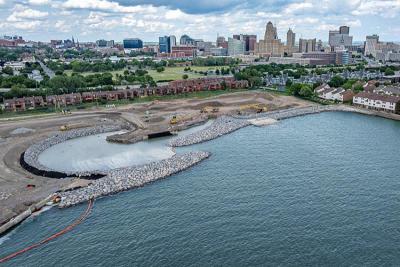
NOAA Fisheries is recommending $4.2 million in Great Lakes Restoration Initiative funding to continue ongoing work restoring important habitat in the Great Lakes. Through this funding, partners will implement projects that support fisheries, habitats, and communities in Great Lakes ecosystems.
NOAA Fisheries is recommending funding to continue the work of three ongoing cooperative agreements:
- Ducks Unlimited will develop plans to restore wetland habitat at Camp Sabroske in Ohio, contributing toward restoring the Maumee Area of Concern. ($752,000)
- The Great Lakes Commission will implement several high priority habitat restoration projects in the Great Lakes region, including in the Maumee Area of Concern in Ohio and the Niagara River Area of Concern in New York. ($3.1 million)
- Genesee County, Michigan, will contribute to the removal of the Hamilton Dam on the Flint River, opening nearly 25 miles to fish passage. ($341,000)
As the largest freshwater system on earth, the Great Lakes are one of the most important natural resources in the world. They support valuable commercial, recreational, and tribal fisheries, as well as industry, transportation, and tourism. This funding will help sustain the many benefits the Great Lakes provide to the environment and communities by:
- Supporting valuable fisheries and coastal resources
- Improving the quality of our water by restoring coastal wetlands
- Providing recreational opportunities for people to use and enjoy
- Increasing the resilience of Great Lakes communities
The Office of Habitat Conservation’s NOAA Restoration Center works in the Great Lakes to support the ecosystems and economies that rely on these valuable international resources. Since 2010, we have supported 98 projects through the Great Lakes Restoration Initiative. These projects have restored more than 5,100 acres of habitat for fish and wildlife and opened more than 520 miles of rivers and streams to fish migration.
The Kincardine Independent
Decision made at last week’s council meeting The long-awaited decision as to the fate of the Dr. Solomon Secord monument was made at the Kincardine Council meeting on Sept. 11. … Continue reading Dr. Secord monument to be destroyed
The post Dr. Secord monument to be destroyed appeared first on Kincardine Independent.







